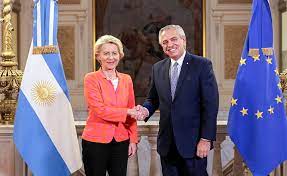EU strikes gas, hydrogen deal with Argentina

Brussels: The European Commission has signed a non-binding agreement with Argentina to facilitate a stable supply of liquefied fossil gas (LNG) to Europe in exchange for cooperation on green energy and Buenos Aires reigning in gas leakage.
Europe’s economic relations with Argentina, a country of more than 45 million people, are strong. Despite the geographical distance, EU investment in the country accounts for half of foreign investment.
Similarly, the bloc is Argentina’s third-largest trading partner, behind Brazil and China, as European Commission President Ursula von der Leyen stressed in June when visiting the country.
While the more comprehensive trade agreement between the EU and its Latin American counterpart, Mercosur, flounders, von der Leyen agreed on a bilateral agreement with Buenos Aires on Monday (17 July). It follows a similar agreement on materials agreed in June.
“Europe and Argentina are partnering for a more secure, sustainable and prosperous world,” she said.
The non-binding agreement hinges on four key aspects: hydrogen and its derivatives, renewables, energy efficiency, and liquefied natural gas (LNG).
With Russian gas flows into Europe at an all-time low, the two partners committed to “enabling a stable delivery of liquefied natural gas (LNG) from the Argentine Republic to the European Union.”
The 45 million-strong country, which heavily relies on natural gas for its own energy consumption, is a serious player in the gas industry – bolstered by the rich shale gas stemming from Vaca Muerta in the South-West.
To export its fracked riches, Buenos Aires is working on a law to boost its LNG industry – with an eye to begin exporting at scale as early as 2027.
The agreement insists that supplying LNG will be “consistent with [the EU’s and Argentina’s] respective long-term decarbonisation objectives and consistent with the goals of the Paris Agreement.”
Likely as a concession to Brussels, the agreement also insists that Argentina tackles its leaky gas wells. In 2022, at least one new gas well was drilled in Vaca Muerta per month.
Meanwhile, the formerly Argentina-based NGO Center for Human Rights and Environment warned in 2018 that at least 5% of produced gas was entering the atmosphere, often due to operators venting surpluses to maintain operational security.
“The Participants endeavour to reduce methane leakages in the fossil gas supply chain to the maximum technically feasible level,” the EU-Argentina agreement stresses, adding that new technologies should help tackle “venting and flaring.”
Both venting and flaring are commonplace methods of ensuring production equipment does not get damaged by too much fossil gas. Given methane’s extreme climate impact, it is 28 times worse than CO2 on a 100-year basis, uncontrolled venting is among the most climate-damaging by-products of producing fossil gas.
The agreement also points to integrating “recovered methane into the supply chain.” Methane that would otherwise leak into the atmosphere can be captured and used regularly. One key source may be landfills, like Norte III in Buenos Aires, which account for about half of the city’s methane emissions.
“In large parts of your beautiful country, in the large plateau of the South, you can only hear one sound: this is the sound of the wind, running undisturbed,” explained von der Leyen in June when speaking to business executives.
Argentina has all it takes to become a “renewable energy powerhouse,” she said, adding that “the extraordinary Patagonian winds are a blessing of nature.”
In practice, the EU-Argentina agreement is sparse on the details – aside from a commitment to “facilitate investments necessary to increase energy trade between the Participants.”
EURACTIV asked the Argentinian embassy whether Buenos Aires was looking to get a slice of funding through the European Hydrogen Bank or German H2Global initiative, but no response was forthcoming by the time of publication. This story will be udpated as and when a response comes.
European investments are largely expected to come through the European Gateway Initiative, which has a “Team Europe” approach, meaning that EU countries invest under the banner of the bloc.
For example, France and the EU have supported upgrading and bringing the country’s electricity grid up to speed. Other projects include waste and water management support and aid in exploiting the country’s rich mineral resources.
Whether similar initiatives will help fund the country’s nascent LNG infrastructure is unclear





